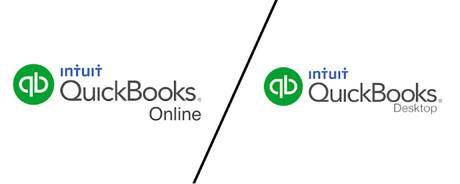
Are you torn between using QuickBooks Online or Desktop? Both versions of the accounting software have their unique selling points and features that cater to different business needs. Choosing the right one for your business can be a daunting task. That's why we've put together this side-by-side comparison of QuickBooks Online vs Desktop, highlighting their differences, pros, and cons. By the end of this article, you'll have a better understanding of which version is best suited to meet your specific business requirements. So let's get started!
QuickBooks Online vs Desktop Key Differences
There are several key differences between QuickBooks Online vs Desktop that can help you decide which one is right for your business. One of the primary differences is accessibility. QuickBooks Online is a cloud-based software, meaning it's accessible from any device with an internet connection. In contrast, QuickBooks Desktop requires installation on a local computer.
Another significant difference between the two versions is their pricing models. While both offer similar features and functionalities, QuickBooks Online follows a subscription-based model with monthly fees based on the number of users and level of service required. On the other hand, QuickBooks Desktop has upfront costs for purchasing licenses and upgrades.
One feature that sets QuickBooks Desktop apart from its online counterpart is its robust inventory management capabilities. It offers more advanced tools for tracking products and materials than what's available in QuickBooks Online.
In terms of automation, both versions have automation tools to streamline accounting processes such as invoicing and bill payments. However, there are slight variances in functionality due to their different interfaces.
Ultimately, understanding these key differences can make all the difference when deciding which version of QuickBooks to use for your business needs!
QuickBooks Online Overview
QuickBooks Online is one of the most popular accounting software solutions for small businesses. It's a cloud-based platform that allows users to access their financial data from anywhere with an internet connection. The software has been designed to be user-friendly, making it easy for business owners and accountants to manage their finances.
One of the best features of QuickBooks Online is its accessibility. As a cloud-based solution, you can access your financial information from any device with an internet connection. This means that you can work on your finances even when you're on the go or working remotely.
Another great feature is its integration capabilities. QuickBooks Online integrates seamlessly with many other third-party apps and tools such as payment processors, payroll systems, and inventory management systems. This makes it easy to keep all your financial data in one place without having to switch between different platforms.
In terms of pricing, QuickBooks Online offers several subscription plans based on the size and needs of your business. There are also add-on modules available for more advanced features like project management or time tracking.
QuickBooks Online provides a robust accounting solution for small businesses looking for flexibility and accessibility in managing their finances. Its cloud-based system makes it easy to collaborate with team members or outside professionals while keeping sensitive financial information secure at all times.
QuickBooks Desktop Overview
QuickBooks Desktop is a powerful accounting software designed for small businesses. The desktop version can be installed on your computer and accessed offline, making it ideal for those who may not always have access to the internet.
One of the key features of QuickBooks Desktop is the ability to manage inventory and track job costs. This is particularly useful for businesses that sell physical products or provide services that require materials or supplies.
Another benefit of using QuickBooks Desktop is its advanced reporting capabilities. You can generate detailed financial statements, including balance sheets, profit and loss reports, and cash flow statements. This allows you to gain valuable insights into your business's performance over time.
In addition to these features, QuickBooks Desktop also offers customizable templates for invoices, estimates, purchase orders, and more. You can easily personalize these documents with your own logo and branding elements to give them a professional look.
QuickBooks Desktop offers many robust features that can help streamline accounting processes for small businesses. While it does require installation on a local computer and doesn't offer cloud-based access like its online counterpart, it remains a popular choice among small business owners thanks to its advanced functionality.
QuickBooks Online vs Desktop: Feature Comparison
When it comes to comparing QuickBooks Online vs Desktop, one of the most critical factors is the features each platform offers. While both options have similar functionality, there are some key differences worth noting.
QuickBooks Desktop offers a robust range of features that make it an ideal solution for businesses with complex accounting needs. Some of these include advanced inventory management capabilities, job costing tools, and customized reporting options.
On the other hand, QuickBooks Online provides users with more flexibility and accessibility. Features like automatic data backups and mobile access allow business owners to manage their finances from anywhere at any time.
Both platforms also offer different payment plans depending on your specific needs. For example, QuickBooks Desktop requires a one-time purchase fee while QuickBooks Online has a monthly subscription model.
Ultimately, when deciding between QuickBooks Online vs Desktop feature comparison should be at the forefront of your decision-making process. Consider which features are essential to running your business smoothly and efficiently before making a choice.
QuickBooks Online vs Desktop Pros and Cons
QuickBooks Online and Desktop have their own pros and cons, which you should consider before choosing the right one for your business. QuickBooks Online is cloud-based software, accessible from any device with an internet connection. This means you don't need to install the software on every computer in your office.
One major advantage of QuickBooks Desktop is its robust functionality. It has a wider range of features compared to QuickBooks Online, including industry-specific versions that cater to niche businesses.
On the other hand, QuickBooks Online offers automatic updates and backups, making it easier for users to manage their books without worrying about losing data or outdated software. Additionally, it allows for multiple user access levels at no additional cost.
However, some users may find QuickBooks Online's pricing model confusing as they offer different plans based on features required by users. Meanwhile, desktop versions require a high upfront cost but can save money over time if used long-term.
Ultimately, when deciding between the two options it comes down to personal preference and business needs. Consider factors like budgetary constraints or whether remote work flexibility is necessary before making your decision.
Which is Right for You?
Deciding between QuickBooks Online and Desktop can be a tough decision, but ultimately it comes down to your specific business needs. Here are some factors to consider when making your choice.
Firstly, consider the size of your business. If you have a small business with only a few employees or contractors, then QuickBooks Online may be more suitable as it provides access for up to 25 users. On the other hand, if you have a larger company with multiple locations or departments that require simultaneous use of QuickBooks, then Desktop may be more appropriate.
Another important factor is cost. While both versions offer various pricing plans, keep in mind that Desktop requires an upfront payment whereas Online offers monthly subscriptions. Additionally, Desktop requires regular updates which can incur additional costs.
Consider also the level of customization required for your accounting needs. QuickBooks Desktop has been around for longer and therefore has more robust features compared to its online counterpart which is still relatively new in comparison.
Think about accessibility and convenience - do you need remote access? Are you always on-the-go? If so then QuickBooks Online will allow easy access from any device connected to the internet while QuickBooks desktop is limited by installation location.
Ultimately it's important to assess what features matter most for your business before deciding on whether QuickBooks online vs desktop works best for you!
Conclusion
After considering all the differences, features, pros and cons of QuickBooks Online vs Desktop, it's clear that both versions have their own unique advantages.
QuickBooks Online is perfect for those who want a cloud-based accounting solution with easy accessibility from anywhere and at any time. It’s ideal for small business owners who are always on-the-go and need to manage their finances remotely.
On the other hand, QuickBooks Desktop has more advanced features and can handle larger amounts of data than QuickBooks Online. It's suitable for businesses that require a robust accounting software system with powerful customization options.
Ultimately, choosing between QuickBooks Online or Desktop depends on your specific needs as a business owner. Consider factors like your budget, staff size, industry requirements, and how you prefer to access your financial information when making this decision.
Whichever version you choose – be it QuickBooks Online or Desktop – ensure to make use of its full functionality to achieve accurate financial reporting and help grow your business!

